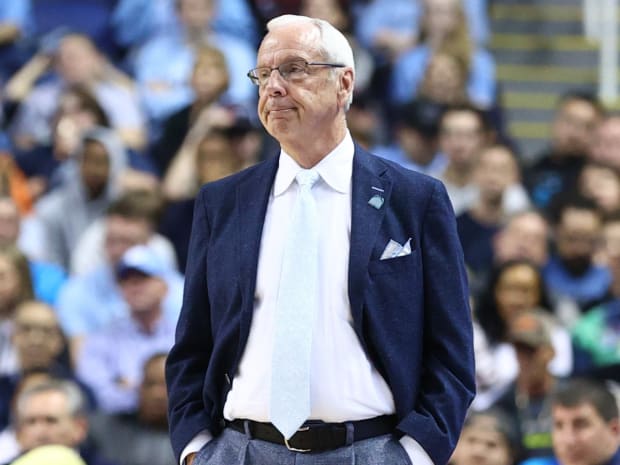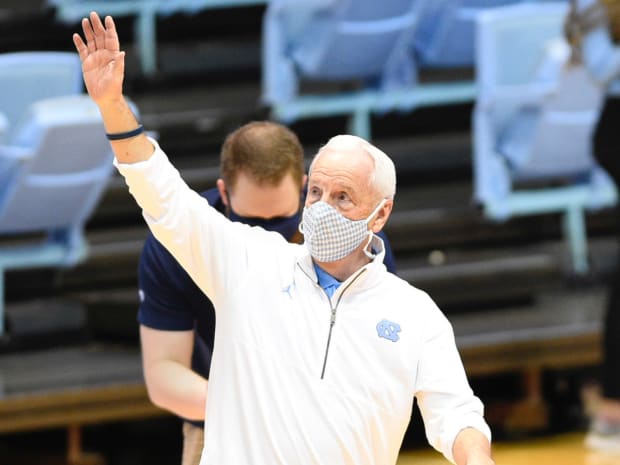North Carolina's legendary coach was humbled over his last few years on the job, and he showed how much it affected him while saying goodbye.
A legendary coach who is walking away from his dream job of his own volition is likely to shine a gilded light on his work. Accentuate the positive. Ignore the negative. Treat yourself to a greatest hits recitation and bathe in the glow of adoration.
And then there is what Roy Williams did Thursday.
Upon
announcing his retirement as the basketball coach at North Carolina, Williams instead gave us a raw, human, and at times painful goodbye. A coach who had all the answers for decades revealed that he became consumed with self-doubt and disappointment. It was a rare viewing of what it’s like for a relentless winner when the agony of defeat outweighs the joy of victory. This was more self-flagellation than self-indulgence.
An all-time great, winner of three national championships and more than 900 college games, was so bothered by his self-described shortcomings that they are chasing him out of the sport. “I no longer felt I was the right man for the job,” said arguably the rightest man ever for the Carolina job. And he said it repeatedly, through sniffles and pauses.
“The last two years have been really hard,” Williams said. “… I felt that I made mistakes. … I just never got the team this year where I wanted them to go. I didn’t get it done. … I didn’t push the right buttons. … I just don’t feel I’m the right man any longer.”
Williams reflected on what one of his old assistants at Kansas, Jerry Green, once told him about his work there: “You’re getting these kids to pull the nails out of the floor for you.” Watching his teams play the past two seasons, he didn’t see that same fire from his players. “I didn’t get the message to them well enough,” he said.
In 2019-20, Carolina went 14-19—a complete disaster by that program’s standards. The 70-year-old Williams said he wasn’t going to go out on a losing note, so he came back this season. The Tar Heels were improved, but still not up to Williams’ standards, going 18-10 through the Atlantic Coast Conference tournament and earning a No. 8 NCAA Tournament seed.
Then they were blown out by Wisconsin in the first round, the third straight tourney ouster by at least 17 points since winning the title in 2017. “I wasn’t going to wait for strike three, is the bottom line,” he said.
After that game, a discouraged Williams recognized the end—some 12 years after his wife, Wanda, encouraged him to walk away after the 2009 national championship. (She also urged him to retire after the third title, in 2017.) He called North Carolina athletic director Bubba Cunningham last Tuesday to tell him he intended to retire, and Cunningham tried to talk him out of it over the course of the next couple of days. On Sunday, Williams met with UNC chancellor Kevin Guskiewicz, who urged him to take 24 hours to think through the decision.
Williams did, and there was no changing his mind. He went to play Augusta National Tuesday and Wednesday (he says he shot 88 and 87), but spent his time between shots thinking about breaking the news to everyone. Then he came home to drop this bombshell on college basketball Thursday.
He walks away with only three coaches having won more national titles: John Wooden (10), Mike Krzyzewski (five) and Adolph Rupp (four). His nine Final Fours trail only Wooden (12), Krzyzewski (12) and Williams’s mentor, Dean Smith (11). He’s third on the list of all-time NCAA tournament appearances with 30, behind only Krzyzewski and Jim Boeheim (35 apiece).
Like almost every great coach in a checkered sport, Williams leaves with both glory and attendant controversy. For many, the cloud of academic scandal that hung over North Carolina athletics but went unpunished by the NCAA will remain as much a part of Williams’s legacy as his offensive acumen and recruiting prowess. Nobody gets out of the sausage factory that is college basketball unscathed.
But Williams has a legion of supporters that includes the vast majority of his former players, and many of his competitors.
“Telling the current team was really, really hard,” said Williams, who lauded those from the 2020-21 squad who were in attendance at his press conference in the Dean Smith Center—even those who currently are in the transfer portal. He lauded the older guys who were there, too. And he lauded just about every coach who was ever above or beneath him on an organizational chart. (With the certainty that Williams wants one of them—he didn’t name names—to be his successor. “I’ve given my opinion very strongly about what I’d like to see happen with the program.”)

In many ways Williams is a product of a different era, and proudly so. The onrushing sea change in college athletics is something that could contribute to a 70-year-old wanting to get out of the game. From the one-time free transfer rule that could be enacted this month to impending Name, Image and Likeness legislation, the balance of power is at last tilting more in the direction of the players than the coaches and schools.
Williams is not the only basketball coach looking at this new landscape and weighing his options. We are poised for a massive turnover at the top of the sport, given the ages of many top coaches. Mike Krzyzewski is 74, Jim Boeheim is 76, Rick Pitino is 68, Tom Izzo is 66. Their time, collectively, is short. Their approach, collectively, is old school.
Williams is as old-school as any of them. Sifting through the transfer portal and navigating an era of player commoditization is as foreign to him as TikTok and Clubhouse. Williams made some of his feelings known when he joked that he was “opting out” and followed that by saying, “That’s the most ridiculous phrase I ever heard in my life. Why don’t you just say, ‘I quit.’“
But he insisted that his retirement is less about what’s coming than what’s transpired the past two seasons. Expecting himself to still be winning championships and failing to do so was enough to drive him into retirement.
“Ol’ Roy is going to feel pretty good about what we accomplished,” Ol’ Roy said. “And Ol’ Roy is going to feel pretty proud. But Ol’ Roy is also selfish. He wanted more.”
No comments:
Post a Comment